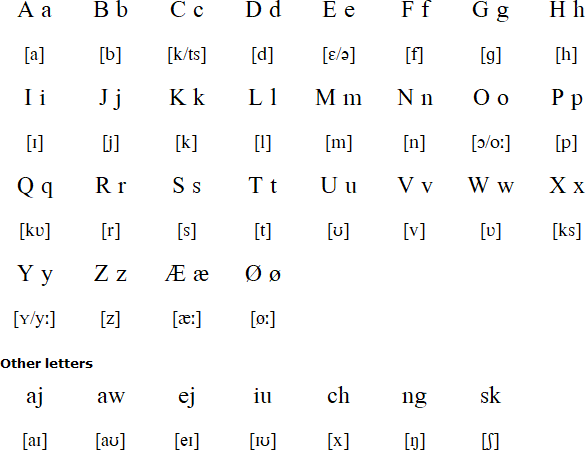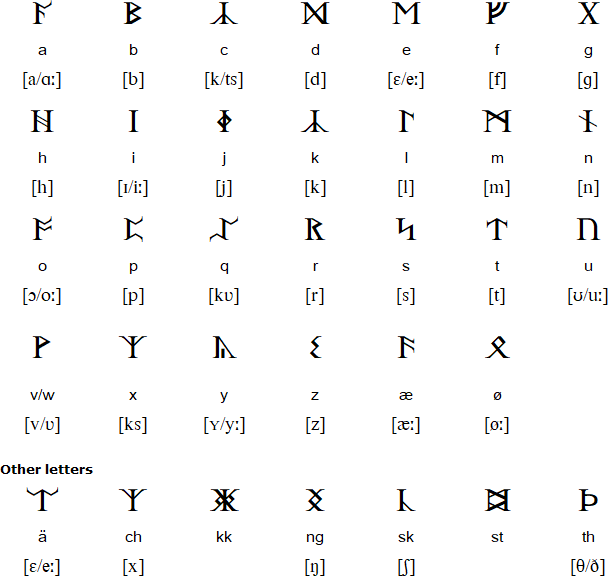Folkspraak (FS) is an International Auxiliary Language that is currently in development. It is intended to serve as a lingua-franca for communication with speakers of Germanic languages and it is based on features common to the major modern Germanic languages.
The project is intended to be a co-operative and democratic effort by a group of people who currently meet on a Yahoo group. The project to develop Folkspraak has yet to be completed and it is beset with disagreements over such features as phonology, orthography, vocabulary, grammar and syntax. The failure to reach agreement means that there is currently no "official" form of Folkspraak and there are a number of "dialects", which are individual group members´ versions of how they think the language should be.
The primary source languages used for the development of Folkspraak are English, Dutch, German, Danish, Norwegian Bokmål and Swedish - though some members refer to further languages, such as Frisian, Low German and Norwegian Nynorsk. The divergence of the source languages means it has frequently proven harder than first anticipated to find elements sufficient to operate the language that are truly common to a majority of the source languages.
The Folkspraak described below is the "dialect" of Folkspraak Yahoo member David Parke. The method of deriving phonology, vocabulary and grammar for his dialect is inspired by the method used in the creation of Interlingua, but the sample of source languages are different. The primary sample languages for Parke's Folkspraak are English, Dutch, German and Danish, Norwegian and Swedish (the three Scandinavian languages are treated as one entity in a way analogous to how the creators of Interlingua treated Spanish and Portuguese). There are also two secondary sample languages, Interlingua and Slovio (both of them constructed IAL themselves).
A lexical feature is present in Parke's Folkspraak if a cognate feature is present in three or more of the primary source languages. If a cognate feature is present in only two of the primary source languages, it can still be present in FS if it is present also in one or more of the secondary source languages.
The grammar includes features that are common to all of the primary source languages. Controversially for an IAL, the implication of this is that Parke's FS has a number of irregular and strong verbs and also retains grammatical cases and gender for personal pronouns. Parke intends his version of FS to be used not just as a lingua-franca between speakers of Germanic languages, but also to help native speakers of non-Germanic languages communicate with the Germanic-speaking world. It is also intended as "primer" language leading on to further study of real Germanic languages. The complex features such as strong verbs help introduce students to features they will encounter in real Germanic languages.
The phonology of Parke's FS is based upon the most typical and predominant evolution of phonemes from proto-Germanic into the phonemes of the modern Germanic languages. For example proto-Germanic *î has regularly evolved into [aɪ] in English and German and into very similar [ɛɪ] in Dutch, and into [i:] in Scandinavian. Therefore the most common evolution of *î is considered to be [aɪ] and Parke's FS has this sound in such words as wît (white) and mîn (my/mine).
The orthography is a compromise between total regularity and recognition for as great a number of Germanic language speakers as possible. The orthography is intended to provide clues to cognate words possibly form in the speaker's native Germanic language. As such, it has uni-directional regularity; where a reader can know how to pronounce a word based on how it is spelt, but will not necessarily know exactly how to spell a word on the basis of how it sounds. There are in fact several versions of Folkspraak with different orthographies.

There is also a way to write Folkspraak with the Runic alphabet.

Download alphabet charts for Folkspraak (Excel)
All mensklik wesings âre boren frî on' gelîk in werđigheid on' rejte. Đê âre begifted mid ferstand on' gewitt on' skulde behandele êlkên in en gêst av brôđerhêd.
A recording of this text by Crawford J. Bennett, Jr.
All human beings are born free and equal in dignity and rights. They are endowed with reason and conscience and should act towards one another in a spirit of brotherhood.
(Article 1 of the Universal Declaration of Human Rights)
Information about Folkspraak | Phrases | Numbers | Tower of Babel
Information about Folkspraak
http://en.wikipedia.org/wiki/Folkspraak
https://en.wikibooks.org/wiki/Folksprak
https://linguifex.com/wiki/Folksprak
https://irespa.eu/daan/Taal/fs/folkspraak_151109.pdf (PDF, in Dutch)
Blissymbolics, Esperanto, Folkspraak, Glosa, Ido, Interglossa, Interlingua, Interlingue/Occidental, Interslavic, Lingua Franca Nova, Lojban, Novial, Romance Neolatino, Romániço, Slovio, Solresol, Uropi, Volapük
Languages written with the Latin alphabet
Page last modified: 23.04.21
[top]
You can support this site by Buying Me A Coffee, and if you like what you see on this page, you can use the buttons below to share it with people you know.

If you like this site and find it useful, you can support it by making a donation via PayPal or Patreon, or by contributing in other ways. Omniglot is how I make my living.
Note: all links on this site to Amazon.com, Amazon.co.uk
and Amazon.fr
are affiliate links. This means I earn a commission if you click on any of them and buy something. So by clicking on these links you can help to support this site.
[top]